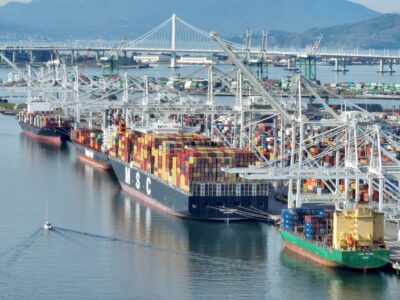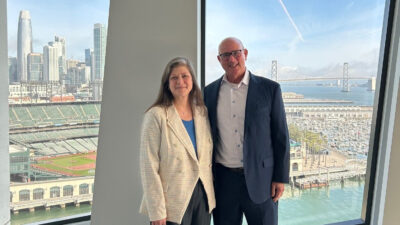Banner Year in Sacramento for Bay Area Council Legislative, Budget Priorities
With just one day left before the Oct. 14 deadline for Gov. Newsom to sign or veto legislation, the Bay Area Council is celebrating what appears to be a remarkable year in securing legislative and budget wins. Some of the best was saved for last, with Gov. Newsom this week signing a raft of bills, four of which the Council sponsored, that represent perhaps the most significant progress in years in addressing California’s persistent housing crisis.
In addition to our legislative wins, the Council was victorious in June in helping secure $5.1 billion in the state budget for public transit that was teetering on the edge of a “fiscal cliff.” Our advocacy also helped restore $25 million in the state budget for funding to support the construction of accessory dwelling units (ADUs). The Council, partnering with the New California Coalition, also threw its strong support behind a package of 11 bills that Gov. Newsom had called for to streamline and accelerate construction of clean energy, water and transportation infrastructure projects.
Key legislation signed this week that the Bay Area Council sponsored or co-sponsored includes:
AB 1633 (Ting, San Francisco) is generally regarded as the most important CEQA reform bills this year and will prevent local governments from pocket-vetoing development projects by refusing to complete required environmental reviews under CEQA. Instead, local governments are required to set timelines for the completion of environmental reviews in addition to other requirements. The Council overcame strong opposition from the powerful State Building and Construction Trades as well as environmental groups.
AB 1033 (Ting, San Francisco)allows cities and counties that have a local accessory dwelling unit (ADU) ordinance to allow ADUs to be sold separately or conveyed from the primary residence as condominiums.
AB 1114 (Haney, San Francisco) prevents cities from issuing building code permits in a discretionary way, after a project has been gone through the full process of approval and has been entitled. One of the only localities that still allows these appeals is the city of San Francisco. This bill aligns with Council efforts to accelerate the process of building housing in the city.
AB 1287 (Alvarez, San Diego)requires local governments to grant additional housing density and other incentives for builders that agree to increase low- or moderate-income units above minimum requirements.
SB 76 (Wiener, San Francisco)allows San Francisco to develop ordinances for entertainment zones that engage brick and mortar bars and restaurants to set up temporary open container areas in these zones, encouraging activation of public spaces, street fairs, music festivals, and more. This bill is important in helping the city’s economic recovery and bringing back visitors.
The Council also successfully advocated for Gov. Newsom’s veto of four bills, exceeding even our expectations. Newsom vetoed AB 819 (Bryan, Culver City), which would have decriminalized fare evasion on public transit. This was a major win for the Council as we focus on improving safety on public transit to bring back riders. Newsom also took a red pen to AB 1356 (Haney, San Francisco), which would have unnecessarily expanded existing Worker Adjustment and Retraining Act (WARN Act) requirements to the detriment of many employers.
Newsom earlier vetoed AB 316 (Aguiar-Curry, Davis), which would have crippled California’s ability to compete in the fast-emerging autonomous vehicle/trucking industry. The Council, working collaboratively with the New California Coalition and the Los Angeles County Business Federation (LABizFed), also played a critical role in helping secure a veto of SB 799 (Portantino, Burbank), which would have extended unemployment insurance to striking workers. Council President and CEO Jim Wunderman and our advocates at Brownstein Hyatt Farber Schreck, LLP lobbied furiously in the final days of the legislative session and beyond to convince the Governor to veto SB 799.
Other key legislative wins include:
Defeating (for now) SB 532 (Wiener, San Francisco), which would have raised tolls on Bay Area state-run bridges to provide more funding for public transit. The Council worked aggressively to sideline SB 532, which came right on the heels of our work to win $5.1 billion in the state budget for transit. The Council argued that increasing tolls would have a disproportionate impact on workers, particularly lower-income and people of color, whose jobs require them to drive. SB 532 is a two-year bill that we will be keeping a close eye on next year.
Defeating (for now) AB 1000 (Reyes, San Bernardino), another two-year bill we’ll be monitoring next year that would effectively block or severely restrict construction of critical logistical facilities that are integral to the state’s supply chain and economy.
Passing SB 434 (Min, Irvine), which requires the state’s 10 largest transit agencies to provide data showing how they are addressing safety concerns on their systems and the experience of riders as it relates to violence and other criminal activity.
Passing AB 1377 (Friedman, Burbank), which aims to take the financial strain off of public transit agencies for addressing homelessness and other social ills in their systems and holding social service and other organizations that receive state funding accountable for doing outreach.
Passing SB 43 (Eggman, San Joaquin), which redefines “gravely disabled” in such a way as to strengthen the ability of local governments to provide, under a conservator, housing and health service to people suffering severe substance abuse disorder and/or a mental health disorder.
Passing SB 410 (Becker, San Jose), which removes barriers to timely electricity service connections for new construction projects and rehabs by establishing clear and reasonable timelines and other accountability measures for utilities to complete hookups.
Amending SB 272 (Laird, Santa Cruz), which would have required every Bay Area city to develop its own sea level rise adaptation plan siloed from extensive regional planning efforts to date. The Council helped lead a coalition to amend the bill to ensure these local adaptation plans incorporated existing planning efforts and will be used as a carrot to access state coastal resilience funding and not a stick to punish cities or prevent development.
Defeating AB 1337 (Wicks, Berkeley), which would have given the State Water Resources Control Board unprecedented statutory authority to curtail water diversions under any claim of right during any water year, drastically undermining a core legal tenet of water supply reliability and acting as a disincentive against local water agency supply investments.
Defeating SB 460 (Bauer-Kahan, San Ramon), which would have allowed members of the public to petition the State Water Resources Control Board to issue interim relief orders against any water user prior to a hearing if suspected of violating vague, Gold Rush-era provisions of the state constitution and open a new arena for water conflict between environmentalists, cities, farmers, and other interests.





